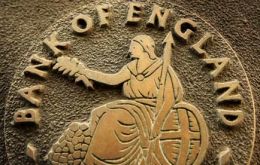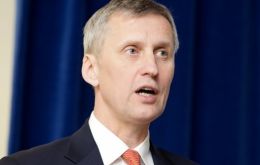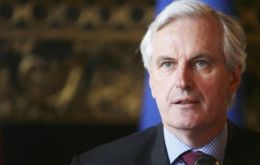MercoPress. South Atlantic News Agency
Tag: Bank of England
-
Friday, January 11th 2013 - 08:21 UTC
Bank of England keeps monetary policy unchanged waiting for GDP figures

The Bank of England on Thursday decided not to extend its quantitative easing (QE) stimulus program, which has injected £375bn into the UK financial system. It is also keeping its key interest rate unchanged at 0.5%, where it has been since March 2009.
-
Friday, December 7th 2012 - 05:26 UTC
Bank of England at crossroad on stimulus program despite weaker economy

The Bank of England has decided not to extend its quantitative easing (QE) stimulus program, which has injected £375bn into the UK financial system.
-
Monday, November 26th 2012 - 19:04 UTC
Canadian considered G7 best central banker to lead Bank of England for next five years

Mark Carney has been named as the new Bank of England governor, who will replace outgoing head Sir Mervyn King. The role of the governor is the most important unelected position in Britain, and is chosen by the British Government.
-
Friday, November 9th 2012 - 06:15 UTC
Bank of England leaves further stimuli and rate on hold

The Bank of England has decided not to extend its quantitative easing (QE) stimulus program, which has injected £375bn into the UK financial system. Under QE, the Bank creates money and uses it to buy government bonds to try to stimulate the economy.
-
Saturday, November 3rd 2012 - 04:03 UTC
Bank of England governance ‘defective’ with ‘centralized and hierarchical’ structure

Governance of the Bank of England is “defective”, according to the chairman of the Treasury Committee following the publication of three independent reviews into the Bank's performance. Andrew Tyrie said the reviews were too little, too late.
-
Monday, October 1st 2012 - 20:44 UTC
UK banking reform at the heart of discussions in the annual Labour conference

UK Labour leader Ed Miliband has indicated that a threat by banks to move abroad would not deter him from breaking them up if they did not agree to revolutionise their operations and put ordinary customers first.
-
Friday, September 28th 2012 - 16:36 UTC
Report recommends complete overhaul of Libor system and jail for those who try to manipulate it

A report into the Libor rate-rigging scandal says the system is broken and suggests its complete overhaul, including criminal prosecutions for those who try to manipulate it. Its author, regulator Martin Wheatley, told the BBC that bankers guilty of fixing Libor in future could be jailed.
-
Friday, August 3rd 2012 - 07:57 UTC
Bank of England waiting for the latest stimuli measures to filer into the economy

The Bank of England has kept interest rates on hold for August, and also held off from any more stimulus measures, as had been expected. Its rate-setting Monetary Policy Committee (MPC) has voted to maintain rates at the historic low of 0.5%.
-
Monday, July 9th 2012 - 18:13 UTC
Euro zone to tighten financial regulation following the Libor rigging scandal

Michel Barnier, the European commissioner in charge of financial regulation, is expected to bring forward changes to his market abuse directive and regulation within in the next weeks, the Financial Times said on Monday.
-
Monday, July 9th 2012 - 18:04 UTC
BoE Tucker denies making any suggestions to Barclays on the Libor (in 2008)

The deputy governor of the Bank of England (BoE) has said he did not give Barclays instructions to lower its Libor submissions in 2008. Paul Tucker said no government minister had asked him to “lean on” Barclays over its inter-bank lending rates. But he also told MPs that the BoE and the government feared that Barclays may need a bailout.
